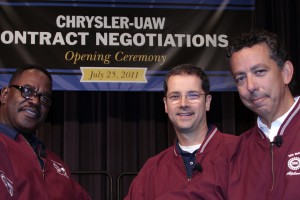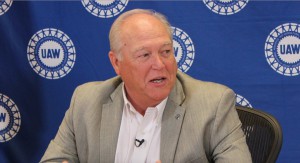
General Holiefield, left, UAW vice president, and Alphons Iacobelli, right, former FCA union negotiator.
The United Auto Workers has flatly rejected the claims by a former Fiat Chrysler Automobile executive, who has plead guilty federal felony charges, that he influenced a critical decision about FCA’s restructuring.
As part of the plea agreement, Alphons Iacobelli, former FCA vice president of labor relations had to admit to his crimes, including the making illicit payments to officials of the United Auto Workers to influence union negotiations.
UAW President Dennis Williams flatly denied the illicit payments to the late General Holiefield, the former head of the union’s Chrysler Department, and union’s top negotiator with FCA, had any influence on the 2011 contract negotiations, which were restrained by a “no-strike” clause that was imposed as part of the government bailout of the automaker.
Holiefield had died and Iacobelli had resigned prior to the start of contentious 2015 negotiations, although a number of members of the union’s staff recruited by Holiefield were present during the negotiations. “There’s just no truth to the allegation that the terms of the collective bargaining agreement were compromised by Iacobelli’s crimes,” Williams said in his letter.
(Former FCA executive pleads guilty to federal charges. Click Here for the story.)
Iacobelli’s plea agreement also claims Holiefield had been “scripted” in advance of a UAW board meeting to discuss the UAW Retiree Medical Benefits Trust sale of Chrysler Group stock back to Fiat.

UAW President Dennis Williams is denying allegations that Iacobelli played a critical role in shaping of Fiat Chrysler.
Williams said Holiefield said “nothing at the meeting that anyone who participated can recall,” during a key meeting of the UAW executive board. Nor did Holiefield have any impact on the stock sale decision by the UAW Retiree Medical Benefits Trust, which was completed in January 2014 and gave Fiat complete control of the Chrysler Group.
Before the sale, the Medical Trust or VEBA, had controlled 41.5% of the Chrysler stock under the terms of the automakers federal bailout, which had been completed in 2009 at a time when the company was on the verge of collapse.
“In fact, a third-party independent fiduciary retained by the UAW Retiree Medical Benefits Trust controlled the Trust’s handling of the stock sale and that independent fiduciary had sole discretion and authority regarding the sale of the stock. This simply was not a matter that Holiefield influenced, much less controlled,” Williams said.
“Mr. Iacobelli’s case is one of personal greed, plain and simple. Iacobelli stole money because he’s a thief who wanted to live a lavish lifestyle well beyond his means. And he corrupted a few UAW officials because he needed their silence to protect his own crimes. Those were terrible acts on all sides. But the fact is those people’s misdeeds did not affect your collective bargaining agreement and no union funds were stolen or lost,” Williams added.
Prior to the 2014 deal, which Iacobelli claimed to have helped script in his plea agreement, Fiat and the UAW had been sparring over the value of the Medical Trust 41.5% stake in the automaker.
In 2012, the medical trust fund, which was set up specifically to pay for the health-care unionized retirees, filed a lawsuit demanding Fiat put a value on its share by selling a block of Chrysler stock on the open market.
(Click Here for details about an FCA analyst pleading guilty in UAW scandal.)
Immediately after the Chrysler bankruptcy in 2009, FCA CEO Sergio Marchionne had discussed publicly the eventual possibility of selling Chrysler stock through an IPO or initial public offering.
After the UAW lawsuit, however, Marchionne changed course and was quoted in the Italian press that Fiat’s planned investment in Italy to boost production means the company does not have the cash on hand to buy the medical trust’s shares outright.
The price the union had sought for the shares held by the medical trust would leave FCA heavily in debt, noted Marchionne, who also clashed publicly with then UAW President Bob King over the value of the shares controlled by the union.
At the end of 2013, however, Fiat agreed to a price for the UAW’s shares, which was higher than Marchionne had been willing to pay only a year earlier. By then, Holiefield had been sidelined by King after complaints surfaced that one Holiefield’s top lieutenants allegedly had been accused by applicants of selling blue-collar jobs at FCA factories around Detroit.
(For our initial report on the indictments, Click Here.)
The Holiefield aide is thought to be one of several UAW officials still facing federal indictment.
